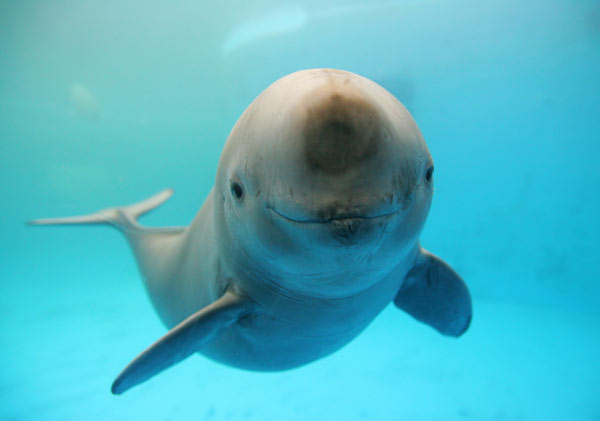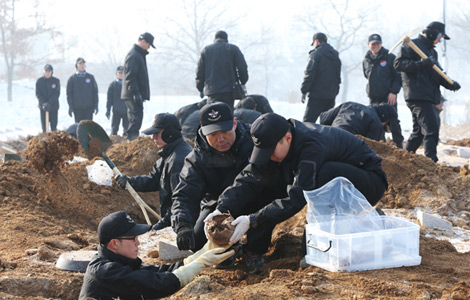Reviving the 'river pig'
Updated: 2013-12-21 23:41
By Deng Zhangyu (China Daily)
|
||||||||
 |
|
A "smiling" porpoise from the Wuhan Institute of Hydrobiology. Gao Baoyan / for China Daily |
Reserves offer perhaps the best chance to save China's critically endangered finless porpoise subspecies, whose nickname comes from the fact they were once as common as swine. Deng Zhangyu reports.
Jiaojiao is free from the fishing net that injured her. She's free from the trauma of her 6-month-old calf's death in that net. And she has ultimately been freed from the captivity that followed her ordeal, after which she was too depressed to eat for a month. While Jiaojiao lost her calf and was separated from her mate this September, her neighbors at the Tian'ezhou oxbow natural reserve in Shishou, Hubei province, are a couple expecting offspring next April.
The rare pregnancy of the critically endangered Chinese subspecies N. p. asiaeorientalis, called jiangtun in Chinese, has shut down 21 kilometers of the Yangtze River's oxbow within the reserve from the public. Wang Chaoqun, a preservation expert at the reserve, regularly examines the rare mammals' health, especially the mother-to-be's.
The reserve's estimated 37 porpoises are among the fewer than 1,000 alive, a survey by scientists from China and the World Wildlife Fund found last year.
Their numbers have continued plummeting for decades. There were about 800 more in 2006.
The creatures are colloquially called "river pigs" because they used to be as ubiquitous as swine. The porpoises known for their "smiling" visages were declared critically endangered this year.
from page 1
"If we don't act in the coming five to 10 years, these animals will vanish," Wuhan Institute of Hydrobiology finless porpoise expert Wang Ding says.
He believes the solution is more natural reserves like the Tian'ezhou oxbow's.
The wetland surrounding the river bend branching from the Yangtze became a protection zone in 1992.
The expecting couple was moved there after the 2008 blizzard disaster froze the Yangtze elsewhere in Hubei.
"We get three or four calves a year," Wang Chaoqun says. "We're trying to increase birth rates through captive breeding."

 US judge strikes down Utah's gay marriage ban
US judge strikes down Utah's gay marriage ban
 India applies to UN to try to solve diplomat crisis
India applies to UN to try to solve diplomat crisis
 China launches communications satellite for Bolivia
China launches communications satellite for Bolivia
 Lonely polar bear in the Arctic Ocean
Lonely polar bear in the Arctic Ocean
 ROK to return Chinese war dead
ROK to return Chinese war dead
 Rodman trains basketball palyers in DPRK
Rodman trains basketball palyers in DPRK
 New York mulls banning e-cigarettes
New York mulls banning e-cigarettes
 Climbers soar to new heights
Climbers soar to new heights
Most Viewed
Editor's Picks

|

|

|

|

|

|
Today's Top News
Freed Russian oil tycoon lands in Germany
Obama: US needs checks on NSA data gathering
India transfers diplomat to UN
US sends envoy to S. Sudan
Obama nominates Baucus as ambassador to China
Tech bans to be relaxed: US
India asks UN to accredit diplomat
Chinese blasts Japan's defense move
US Weekly

|

|






